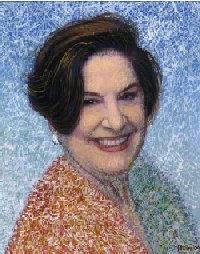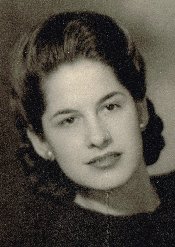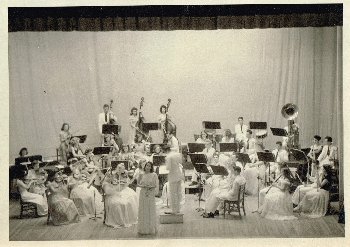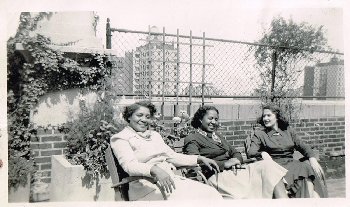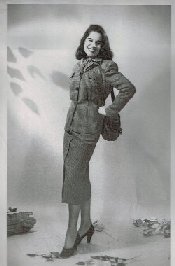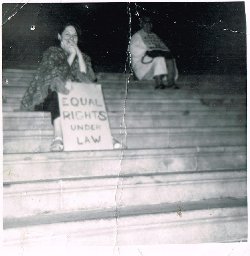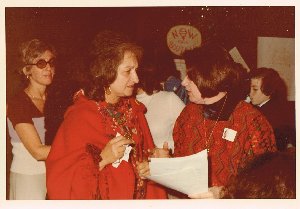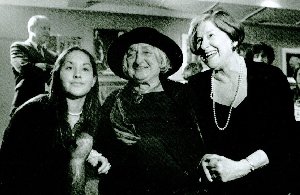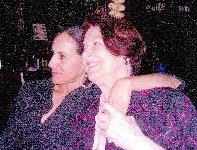| JACQUELINE (JACQUI) MICHOT CEBALLOS -- EARLY NOW
ACTIVIST, FOUNDER/PRESIDENT, VETERAN FEMINISTS OF AMERICA
My mother had taught school before marriage. A devout Catholic, she had seven children in nine years. I was the fourth and only brunette, which was fodder for my siblings. I was an orphan, they'd tell me. And I often felt that I was. Both my parent's spoke "real French" as their ancestors were from France, (not Acadians from Canada), which my mother never let us forget. However, they spoke to us only in English so we never learned this beautiful language. My father was the only boy among nine sisters and his father died when he was ten. He left school at 16, joined the Marines, served in WWI, and later got a degree from Louisiana State University. While we lived in Mamou he was a family man and a strict disciplinarian, but his wife had to stay at home. Any time she did anything in public (which she often did later on), he was furious. Having been the only boy among nine women probably influenced this attitude, but it made me aware early on of the inequality of the sexes, especially in marriage. When I was eight we moved to Lafayette, a college town, where he began a new job with the Veteran's Administration. He spent his free time at the American Legion hall, so was seldom home and the house resounded with intense sibling rivalry. When he was home you could hear a pin drop.
The 1930s were the Depression years. Signs of poverty were all around--unpainted houses, hobos at our door, a scarcity of birds and small animals (killed for food). Government employees were paid, so we were ok. In fact my father was able to buy a repossessed four-bedroom house on a half acre for $6,000. There aren't many great memories of my grade school years, but here's one I'll never forget: At age eight a teacher, putting on a "little operetta," gave me a lead role as Robin Redbreast. At the time my mother was ill and we children were on our own. No one seemed to care about my comings and goings (or my grades). I attended rehearsals, but otherwise I was clueless about many things, and somehow I thought the performance was to start at 8 p.m. The big night I arrived to find the auditorium filled, the children on stage and "I Am Robin Redbreast"--my song!--being played on the piano. In a panic I ran down the aisle, my paper mache costume flapping, and up the steps to the stage to finish the song. The audience must have howled. After the program Miss Whitfield severely reprimanded me, and for the next 30 years every time she bumped into me she would announce loudly, "This is the girl who ruined my operetta." Maybe this influenced my being a loner in my early years. I read a lot, and was aware of what was going on about me. Why were "negroes" so poor and badly treated? Thinking I was helping, I sometimes got them into trouble. Once I urged a black woman to sit in the front of the bus with me. She murmured fearfully, "Please Missis, NO," so I sat in back with her, a decision almost as bad. We were lucky the bus driver only made a menacing remark. The position of women also scared me. It seemed women could be clerks or teachers but ultimately had to marry . I'll never forget the one small paragraph about the great suffrage movement in my sixth grade history book. Or a radio program about the suffragists and my father saying "Turn that thing off!" At 16 I rebelled against the Catholic Church when the priest said, "If it is between the mother and the child, the mother must go." All this awakened my awareness of the extreme inequality of women. I think I was born a feminist. My mother believed that women were as smart as men, but she maintained that their greatest calling was as wives and mothers. I'd say "If men can do it (meaning sex before marriage) so can women!" She thought I'd end up a whore. It took her a while to accept the feminist movement, but in 1971 she got her chapter of the Catholic Daughters to sponsor the Equal Rights Amendment! The Depression continued, but a greater horror was Hitler slaughtering Jews, conquering nations and killing thousands, and the Japanese doing the same in Asia. In 1941 Pearl Harbor was attacked and we were at war. Men and boys were joining the services, including my two brothers, Louis and James. James wasn't old enough, but he plagued our parents until they gave their approval. Every day we heard of the death of a local boy or man. One day it was James, killed in the South Pacific. My early years were plagued by my older sister Beverly. She was pretty and very smart, but in those days a girl's looks were more important than her brains. We were constantly compared and some thought I was better looking. I was known for my singing, and she'd tell me that my voice "was only so-so"; that I was dumb, that the only beauty to my hair (which I wore in braids then) was its length, and on and on . After she graduated and left home I blossomed.
Now in the local college, I majored in music and was in one concert after another, playing viola in the orchestra, singing solo or with a choral group. Teachers like Dr. Ben Kaplan inspired me. A professor of Sociology, he talked publicly about equality for Negroes. I became one of his protégés. He'd feed me books that would strengthen my resolve to leave Lafayette and do something with my life. Meanwhile Beverly, in New Orleans translating mail to and from South America for the war department (she'd minored in Spanish), married a fellow translator from the U.S Army. The war now over, she moved to New York City where her husband's Jewish family lived. Her brother-in-law, a lyricist from Hollywood, was in New York with friends to produce plays on Broadway. They were all very liberal, and now proud of me, she encouraged me to move to New York after graduation. So in 1945, after working the summer at the telephone company for seed money, I moved to the Big Apple to pursue a career as a singer. I loved New York immediately. It was home and is to this day, no matter where I live. I lived in residences "for girls studying the arts" and met interesting young women from all over. For the first time I had Jewish friends. And I met Jenny Rowlands and Alma McKell, black teachers from St. Louis working on their Master's at Columbia. They became my lifelong friends.
At age 21 I had my first romance and was introduced to the constant of single women working on careers and fearful of pregnancy. Several of my friends became pregnant and were forced to abandon their dreams and marry. I always had a boring job, which gave no time for auditions, so I'd take "sick leave", and then get fired. I auditioned now and then, but I wasn't good (or smart) enough to land roles. It seemed that in most cases "girls" were expected to "give out" if they were to receive roles. Two friends advised that this was the only way to get a part on Broadway. Both married important producers and became top Broadway stars. Postwar society was increasingly all about marriage and a home in the suburbs, and my friends were succumbing. At age 25 it seemed that if I didn't marry I'd be an "old maid" like the pathetic-looking women who summered in the city. My boyfriend was now a lawyer in DC doing his internship and talking about marriage, which scared me. It seemed like there was no escape!
I called the Park Avenue hotel where he was staying. "Señor Ceballos is in the suite of John Robert Powers (the famed model agent) at a party," I was told, and my call was transferred there. Soon Lillian and I were on the phone with Alvaro, acting silly, like schoolgirls. "Come over," he said. "We can't, we're babysitting. You come here." But he was in a party with Powers ' models , so we knew he wouldn't leave it. My sister and her husband returned and we were relating our experience with Sr. Ceballos-- the doorbell rang. And there he was. For the next two hours he kept us in stitches, telling fascinating stories. I felt a twinge of disappointment when he mentioned he had three small daughters, but otherwise he was just an interesting friend of Maria's. He invited me to lunch the next day. I'd quit my job to have more time to audition, so I couldn't refuse a good meal. This was the beginning of my accompanying Señor Ceballos all over the city, dining in nice restaurants, seeing Broadway shows at the cost of merely listening to his problems. He'd divorced his wife and left her almost everything, and her brothers , powerful politicos, were trying to destroy him. (In those days divorce was a disgrace, and there was no remarriage for women in Mexico.) He wasn't allowed to see his daughters, and had lost his business and his friends. The story began to bore me, but it was pleasant being with him. And unlike dates in those days, he never touched me. One night at a Latin café in the Village we bumped into a woman from Lafayette out with Mexicans Alvaro knew. (Small world!). From then on we experienced New York as a group, often ending up in Señor Ceballos's suite. Lillian sometimes joined us. One evening I was trying to leave the after-dinner party because I had an audition the next day, but Alvaro kept begging me to stay. Suddenly Lillian burst out: "Can't you see he's in love with you!?" This released something in me that had been dormant. I cared for him, too! I later made the move that changed our relationship--and my life! Years later an astrologer, doing my marriage chart for a class, pointed to a group of planets and said, "Here she says, if I'm going to marry, it will be different." Well it was different! The first years were a roller coaster ride. We had three children and lived in the suburbs, but there was constant harassment from his ex-family trying to get him to return to his "real wife." More seriously, the U.S. Immigration Department was trying to deport him. During WWII, living in New York City working with the Voice of America for the war effort he had signed a document saying that since he would not serve in the war, he was relinquishing citizenship rights. He had a work visa, which he could renew yearly, but after the war he'd gone to Mexico to start a coffee business and hadn't updated it. Thousands of foreign men had married American women during the war and now wanted citizenship, so this was a test case. After several years he lost and was deported, which meant that our children and I were also deported. He had to leave immediately. He returned to his native Bogota, Colombia where he would go into business with his brother. I sold our house, packed and moved to Bogota . I was reluctant to leave my beloved New York, but those years in Bogota were one of the most pleasant eras of my life. My husband continued his import/export business but also opened a boiler factory, which satisfied his creative nature. Bogota had only one million people then (today it is about 11 million). I became involved in the American theater, taught school, was active in the American Women's Club - which I was advised was the only way I'd survive in that macho country. I had a second daughter and did what I could to help women in poverty. There were ups and downs, as my husband was doing business with the States and the peso and the dollar were usually at odds, but in general we had a good life. Friends I made there are friends for life. 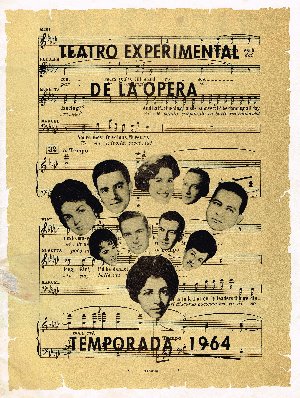 At an audition I heard beautiful voices, met the singers and an incredible Italian voice teacher. With such voices Bogota should have an opera company, I thought. So I started the Teatro Experimental de la Opera. At first it was scary to get the courage to call prominent people for help-but soon we had an impressive board of directors. My husband had always been proud of my singing, but the opera was another thing. Perhaps, someone suggested, he thinks you're having affairs with the tenors. Yet he knew my passion was the opera and I had no interest or time to play around. For whatever reason, two weeks before the opening at the Teatro Colon, he left home. Somehow I managed to survive the opening of the opera, even singing the role of Azucena in "Il Trovatore." But afterwards I collapsed. All Bogota knew what was going on, and whereas before I was admired, now El Tiempo reported that "La opera destruyo un matrimonio." (The opera destroyed a marriage.) Everyone was telling me to "get him back. …he was a good man, a good husband, a good father." Some even felt he was right! I was miserable. A friend returned from a stateside visit, and hearing my story, handed me "The Feminine Mystique." I read it that night, and knew immediately -- it wasn't him, it wasn't me, it was society. And society had to change! I later heard that NOW had been formed, and I began plotting my way back to New York City intent on joining NOW and devoting the rest of my life to working for feminism. My husband returned home as though nothing had happened, but I was different, and so was our marriage. Finally he helped me start an export-import clothing business so I could travel back and forth to New York. What a joy to be there again. I knew I'd never return to Bogota. In 1966 I got an apartment, he sent the children, and thus started the most important chapter of my life. My sons were in private schools for awhile, and later returned to Bogota to be with their father. My daughters got scholarships in a wonderful school of art, music and dance and were happily busy from 8 to 8, so I was free.
Future NOW meetings were different. Run in the traditional way, some of the members kept things at high pitch. Led by Kate Millett, with Anselma dell Olio, Barbara Love, myself and others we were ever planning demonstrations and plotting how to tear down sexist walls. I'll leave the details for my book, if I ever get to it. This bio is to explain what led me to NOW. In a few years I'd attended umpteen conferences, served on the national and NY boards, organized demonstrations and taken part in many, including the Miss America and Ladies Home Journal actions. My daughters Michele and Janine sometimes joined in the demonstrations, and apparently quoted me often in their classrooms, as I was soon meeting mothers whose daughters had repeated their comments - like asking the teacher "Why is it that women have to take their husband's names on marriage?" Those early years I formed the first PR and Speakers committees, took a group of NOW members to Sweden, then the beacon for us in backward USA, cofounded the first feminist theater, appeared often on radio and TV, including the infamous David Susskind show, "Four Angry Women" with Kate, Anselma and Roz Baxendahl, where I urged women to join NOW. That show brought thousands of letters and telegrams and NOW's mailing service couldn't handle it, so cancelled our contract. I'd pick up the
In 1970 I helped Betty Friedan organize the Strike for Equality. My NY NOW strike committee took over the Statue of Liberty and unfurled a 40-foot banner, WOMEN OF THE WORLD UNITE on the top balcony, and MARCH AUGUST 26, 50TH ANNIVERSARY OF SUFFRAGE on the lower. I conceived of "The NOW York Times" with "All the news that would give The Times fits," as though women were running the world. Several brilliant NY NOW members produced this classic in only two weeks. On August 26 we handed our "Times" around NYC and to everyone at the NYTimes. From early morning on that great day I was involved in actions. Besides delivering our NOW YORK TIMES, I held a Mass for "the Repose of the Soul of Male Supremacy" with Constance Comer in Times Square where we vowed to place a statue of Sojourner Truth, demonstrated at the Marriage Bureau, visited advertising agencies, giving them our Barefoot and Pregnant award for their sexist advertising and joined a media group of women's liberationists in protesting the dearth of women journalists. At five p.m. I rushed up West 59th Street to Fifth Avenue afraid I'd see but a small group of women. What I saw was a crowd so huge you couldn't see the end. Thus began the great March which ended in Bryant Park. What a fabulous day that was! As Kate Millett declared as she spoke at the after March rally, "We are a Movement now." In 1971, as president of New York NOW, I was in a Town Hall debate, "A Dialogue on Women's Liberation," with Norman Mailer, Germaine Greer, Diana Trilling, and Jill Johnston and made the case that women had the right and duty "to have a voice in running the world." A classic, the debate was recorded and released as D. A. Pennebaker's 1979 documentary "Town Bloody Hall." I was NOW's Eastern Regional Director in 1971 and its representative to the 1972 Democratic National Convention . Later I served as NOW's representative to the United Nations International Women's Conference. My name isn't listed as a founder, but I cofounded the National Women's Political Caucus in 1971 and the Women's Forum in 1973 and was its first Executive Director. I left both organizations once they were fait accompli. In 1975 I opened a public relations firm and began the New Feminist Talent speaker's bureau. My firm introduced the first Women's Studies course at the Plaza Hotel designed by the Dun-Donnelley Publishing Corporation, which planted the seed for future Women's Studies courses. Later I conceived of the story of women's history through their undergarments (and dance) for Hanes Hosiery, which Marjorie DeFazio and Patricia Horan wrote and produced. It debuted at the Hotel Pierre with Colleen Dewhurst as moderator. As NOW's representative to the International Women's Year Conference in Mexico in 1975, I helped Betty Friedan organize women around the world. It is impossible to include everything I and others did during these crucial years. We were around-the-clock busy, some focusing on special interests, and mine was always organizing and inspiring women to act. My feminism actually brought me closer to my mother, younger sister, Mary Lois, and several nieces who had become feminists. By 1977 I was worn out, my children were into their lives and my cradle was empty . I returned to Louisiana to collapse. In 1982 the ERA failed to receive the requisite number of ratifications before the deadline. Men, including my darling brother, Louis, were constantly being honored for their good works - yet feminists who had changed things radically for the good of women and life in general were never honored - in fact, we were called "feminazis!" Something had to be done about this! Fate spoke once more. Suddenly my income, which my husband had been providing, was stopped. He was Alzheimic and his young mistress had taken control of everything. Again, this is a long story, but I'm convinced my mission in this life was to work in the Feminist Movement, and everything I experienced led to this.
I moved to Florida and renewed friendships with feminists and snowbirds like Mary Jean Tully and NOW cofounder, Gene Boyer. Mary Jean wanted me to interview NOW leaders for her Schlesinger Library History of NOW project so back to NYC I went and began interviewing, not only NOW activists, but radical feminists as well . We activists hadn't been together in over 10 years, and all, with special pressure from Dorothy Senerchia, urged me to organize a reunion. This grew into an organization which in 1993 became Veteran Feminists of America--to preserve the history of Second Wave feminism, to honor all who pioneered the Movement, and to pass the torch. In the 20 years of our existence VFA has honored thousands of pioneer feminists around the country: writers, artists, Women's Studies founders, lawyers and individuals like Catherine East, Betty Friedan, Gloria Steinem, Flo Kennedy, Bella Abzug, Martha Griffiths. Thanks to help from the start of Joan Michel, Sheila Tobias, Amy Hackett and Muriel Fox - VFA is one of the most important feminist organizations today, and our webpage, managed by Jan Cleary, is considered one of the best sources of feminist history and news.
In the extraordinary way fate sometimes works, today I, my children and my husband's Mexican daughters, who met after 17 years, are very close. My daughter, Michele, granddaughter, Natalia and step granddaughter, Adriana Lozon are all involved in VFA! We pioneer feminists had set out to make equality of women and men happen, and though there is much yet to be done, we've accomplished a lot. Today we are up against Conservatives who want to take away the gains we've won and sadly, often led by women who once fought us, now use the power we've earned for them to support the patriarchal system. Still, I have faith that today's young feminists will pick up the banner and keep us on our march for complete equality worldwide, with liberty and justice for all. AWOMEN! Comments Jacqui Ceballos: jcvfa@aol.com Return to Frontpage |
